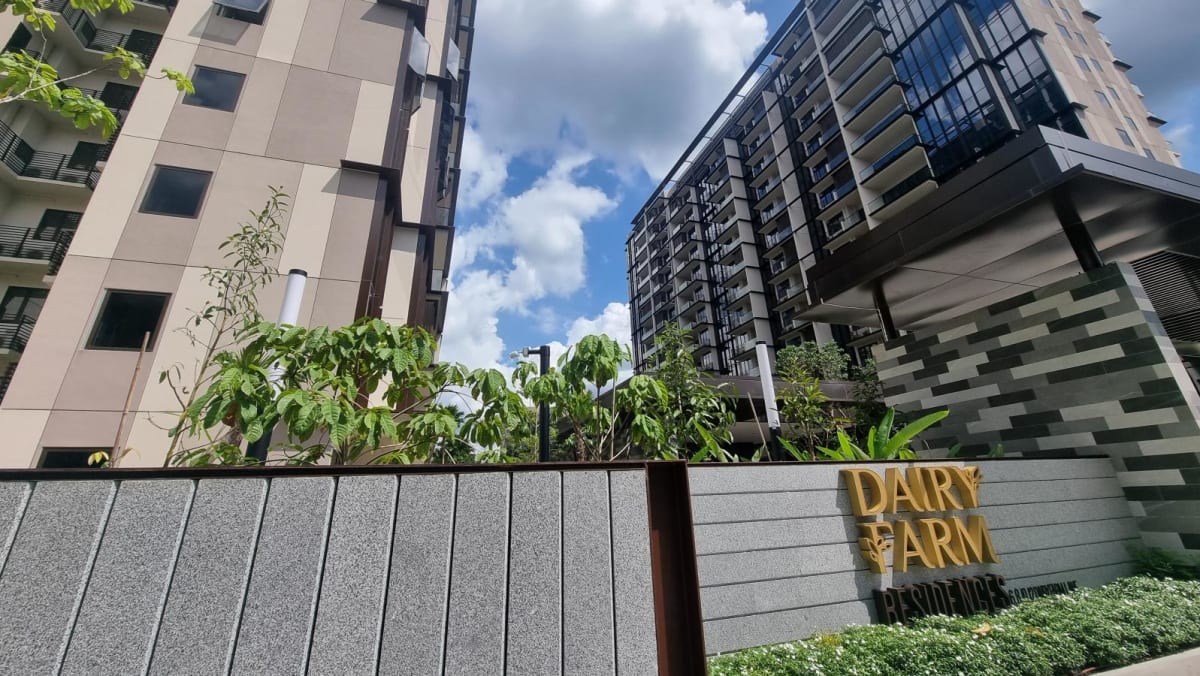
“NO OTHER CHOICE” BUT TO PAY
Most of the residents CNA spoke to had already paid the amount they were asked to in order to get the keys to their flat.
One resident in his 40s said he felt like he had “no other choice” as what he received was a legal letter and that he would be charged for any delay in payment.
He added that several residents were stressed by the situation as they were renting places at the moment before moving into their flat.
“We didn’t want this dispute to cause any delay to our key collection. So, a lot of us like myself, we just went ahead and paid first (to) get the process flowing.”
Another resident, who wished to be known only as Ms Soon, also told CNA that most of them at Dairy Farm Residences are focused on collecting their keys first to move into their flats.
“Everyone’s just very anxious to collect keys and don’t want to delay any further … because we don’t want the developers to use this (maintenance) fee dispute as an excuse to stall the key collection process,” said the 36-year-old who works in media and advertising.
“Then collectively when everyone has moved in already, as a community, we can arrange for a town hall (and) meet the developer.”
Most of the residents who spoke to CNA were not part of the 20 residents who have been in contact with the developers. These residents pointed out that there has been “zero communication” with the rest of the flat owners apart from the 20 in the group.
“The developer is talking to some residents. But it’s not representative of the entire community,” said the resident in his 30s.
“Up to date, we have not received any official communication from the developer regarding this whole maintenance issue that is currently being blown out of proportion,” he said.
“They should address all the residents … Do an official address either through email, through a Zoom (session), town hall or at least write to the residents to let them know what is their stance on this and whether they are looking into it.”
Noting comments from online platforms such as HardwareZone, Ms Soon said: “People were saying ‘Oh you know, you buy (a) condo you should know that you should fork out a maintenance fee. Don’t complain too much’.
“As a home owner of this project, my concern is not so much about forking out the maintenance fees. I only want to understand why is it at this amount.”
CNA has also contacted United Engineers on the concerns raised by residents.
FEES GIVEN AS ESTIMATES
The maintenance and sinking fees collected by unit owners or subsidiary proprietors are used for the maintenance of strata title developments such as Dairy Farm Residences, said Dr Edward Ti, an associate professor of law from Singapore Management University (SMU).
Sinking fund refers to money periodically set aside by the owners of an estate to cover unexpected emergencies and long-term structural costs.
In all strata developments, unit owners wholly own their unit and are also co-owners of the land and facilities that the development sits on, in proportion to how many shares their particular unit has in relation to all the shares which constitute the development, noted Dr Ti, who is also a fellow of the Cambridge Centre for Property Law.
“In this case, I am not aware how the developer represented how much the maintenance fees were to be (for instance, if there was an exclusion clause or non-reliance clause).
“In general, the developer simply had the duty to act reasonably when they forecast how much the maintenance fees should have been,” said Dr Ti.
He added that it was possible that the costs of maintaining the building now exceed the estimate that the developer had in mind.
“However, it would only be responsible to assert that the developer was intentionally representing a lower estimated fee when the units were marketed if this is substantiated with evidence,” he pointed out.
Similarly, Huttons Asia’s senior director for data analytics Lee Sze Teck told CNA that condominium maintenance fees are always given as estimates during the marketing phase.
“(It) is impossible for the developer to get a contract binding quote from the various service providers from security, cleaning, landscaping, maintenance, pest control and so on,” said Mr Lee.
He added that costs have “escalated steeply” after the COVID-19 pandemic, with manpower, material, shipping and interest costs having gone up.
“This has inevitably pushed up the overall costs of managing a condo.”
SMU’s Dr Ti also said that the developer is statutorily obliged to establish maintenance funds according to the Building Maintenance and Strata Management Act 2004.
When a Management Corporation Strata Title (MCST) – an entity that manages and maintains common areas in strata-titled properties such as condominiums – is formed, the developer is to hand over the maintenance funds and records to the MCST.
After the unit owners take over via the MCST, that is the entity that can decide how much funds should be collected, which is done by ordinary resolution, said Dr Ti.
“Thus, in the event that the (home owners) decide that a lower maintenance amount is sufficient to maintain the development, they may so decide.”
The associate professor added that unit owners are also protected during the period where the developer had collected fees as the developer must hand over the financial records in that period.
These provisions help to ensure that the money collected by the developer were spent lawfully, said Dr Ti.

